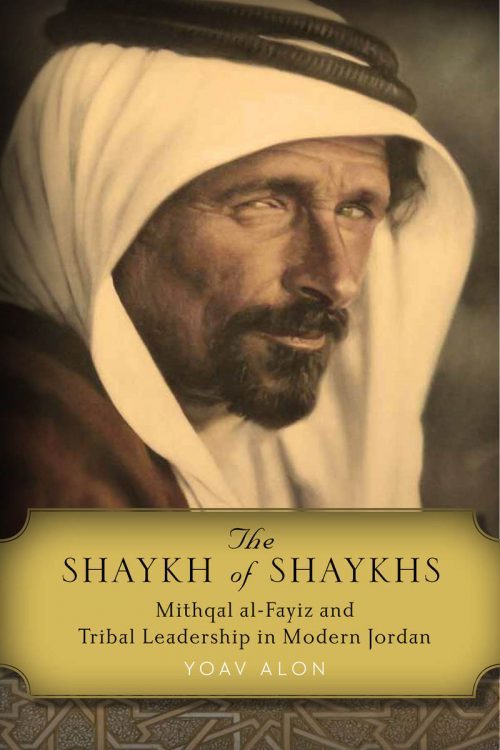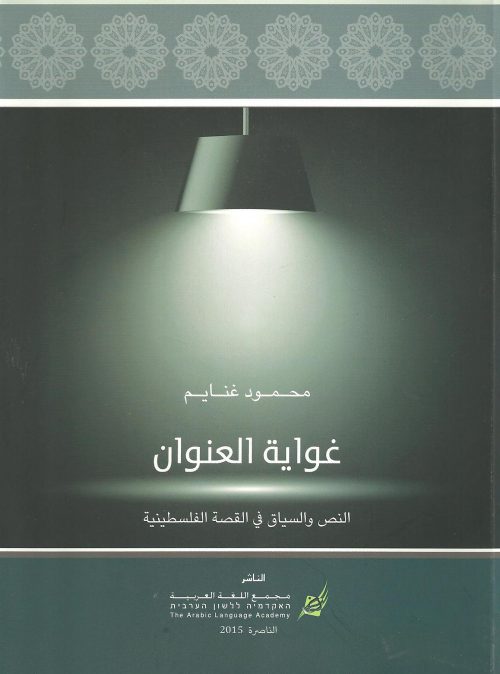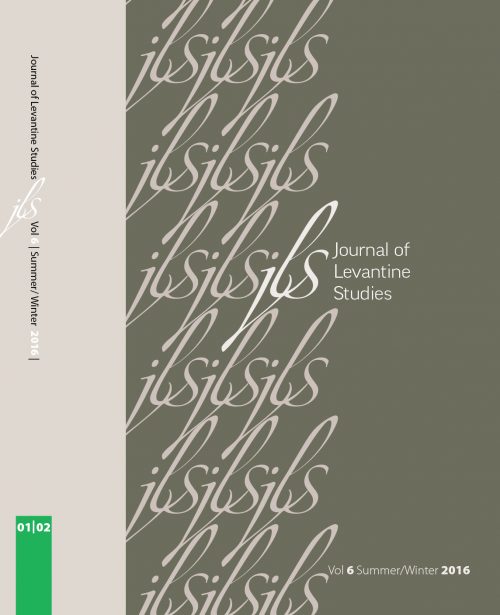-
Add to cartQuick view
Yoav Alon. The Shaykh of Shaykhs: Mithqal al-Fayiz and Tribal Leadership in Modern Jordan. Stanford, CA: Stanford University Press, 2016. 224 pp.
Yoav Alon. The Shaykh of Shaykhs: Mithqal al-Fayiz and Tribal Leadership in Modern Jordan. Stanford, CA: Stanford University Press, 2016. 224 pp.
$5.00Free!Add to cartQuick view -
Add to cartQuick view
Mahmud Ghanayim. غواية العنوان: النص والسياق في القصة الفلسطينية[The Lure of the Title: Text and Context in Palestinian Fiction, 1948–2012]. Nazareth: The Arabic Language Academy, 2015. 240 pp.
Mahmud Ghanayim. غواية العنوان: النص والسياق في القصة الفلسطينية[The Lure of the Title: Text and Context in Palestinian Fiction, 1948–2012]. Nazareth: The Arabic Language Academy, 2015. 240 pp.
$5.00Free!Add to cartQuick view -
Add to cartQuick view
Mahmoud Darwish: Poetry’s State of Siege
Free!Behar describes the cultural and literary strategy of Mahmoud Darwish, who experienced exile and migration more than once in his lifetime and who transferred the arena of the struggle to the region of memory. Denial and memory are at play in the “state of siege” and weigh on the poet’s ability to write. Behar sees the state of siege as evidence of the Israelis’ fear of Arab culture. Both besieger and besieged are trapped together in the same “state.” As Behar writes, Darwish reminds us of the common denominator shared by the Palestinians and the Israelis—the lack of a distinct, authentic culture.
Add to cartQuick view -
Add to cartQuick view
Manuel de Gama de Pádua’s Political Networks: Service, Subversion, and the Disruption of the Portuguese Inquisition
Free!Between 1674 and 1681, the activities of the Portuguese Inquisition were suspended by papal order. But how was it possible that this mighty institution, built by Catholic elites for religious and social discipline and political control, could be so comprehensively disrupted? This article argues that a key factor in motivating this break in Inquisitorial activity was New Christian political activism, and it seeks to explore what “politics” might have meant for such men, in a society that allowed this and other marginal groups no political role. It suggests that the financial and structural needs of the Crown, committed to empire building and pressured by a continuous war for survival during the Portuguese Restoration and subsequent war with Spain (1640–1668), brought a small group of entrepreneurs to the heart of the state. The article also explores the manner in which one member of this group used this influence for political ends. It seeks to offer new insights into this sort of political activity by viewing it from a cross-cultural perspective, rather than solely from a New Christian ethnic or religious standpoint. It will emphasize mechanisms of coexistence, trust, and cooperation and consider politics as not only an activity of the elites but also as something in which those who were repressed or marginalized engaged. This article forms a part of a wider study of early modern politics, trade, and religion viewed through the prism of the period during which the Portuguese Inquisition was suspended. I will explore the role of one entrepreneur living in Lisbon who was involved in the suspension. This man, Manuel da Gama de Pádua, used the skills, strategies, and connections he had gained in cross-cultural trade as a tool to bring about political change, acting as procurator, or legal representative, of the New Christian community.
Add to cartQuick view
- Home
- About JLS
- Issues
- Vol. 9 No. 1 | Summer 2019
- Vol 8 No 2 Winter 2018
- Vol. 8, No. 1: Summer 2018
- Vol. 7, No. 2: Winter 2017
- Vol. 7, 1: Summer 2017
- Vol. 6, Summer/Winter 2016
- Vol. 5, No. 2 Winter 2015
- Vol. 5, No. 1 Summer 2015
- Vol. 4, No. 2 Winter 2014
- Vol. 4, No. 1 Summer 2014
- Vol. 3, No. 2 Winter 2013
- Vol. 3, No. 1 Summer 2013
- Vol. 2, No. 2 Winter 2012
- Vol. 2, No. 1 Summer 2012
- Vol. 1, No. 2 Winter 2011
- Vol. 1, No. 1 Summer 2011
- Blog
- dock-uments
- Subscribe
- Submit
- Contact





